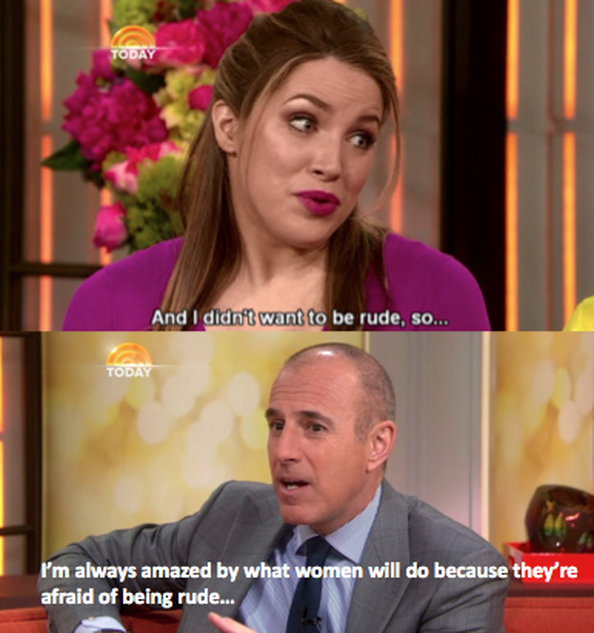|
"That Christmas dress -- my lord!" someone said recently when I posted this photo on my Instagram. It simultaneously felt nice to get a compliment... and slightly uncomfortable, because for some reason, our culture drills into us that it's bad to accept a compliment.
In 2014, a woman named Gweneth Bateman was having a problem online. When guys messaged her with a compliment and she didn't reply, they'd lash out -- usually with something along the lines of, "You should be grateful for my compliment!" And often ending with words like "rude" and "bitch." (Sounds kind of like a cat caller, no?) Gross, right? Stupid, insecure little man-children. This is probably why someone recently asked me on Quora, "Is it bad to think I'm beautiful and to accept compliments with a genuine 'thank you' instead of turning them down?" My answer? I read in Emily Post (she literally wrote the book on manners) once that it’s actually rude to reject someone’s compliment — because, in effect, what you’re doing is criticizing their taste. The polite thing to do is accept the compliment with a “thank you” — and, if you want, some kind of softener. Friend: You’re so beautiful. You: Thank you! I like to think I look just like my mom did at this age. Friend: Wow, you look so young! You: Thank you. I wear sunscreen every day - that’s the secret! (No, but actually. The number one best and most effective way to keep your skin looking young is by wearing sunscreen every single day. Even in the winter. Even if you only spend a few minutes outside. You don't need to burn to get sun damage. It doesn't even need to be fancy -- I just use something like Cetaphil Daily Moisturizer With Sunscreen or Aveeno Positively Radiant Daily Facial Moisturizer With SPF 30 -- whatever drugstore brand is on sale. But, obviously, you want something stronger for summer, extended outdoor, or near-the-equator use -- and you should pair it with a hat and sunglasses, because squinting causes wrinkles, too.) I really dislike how society has managed to convince to many people that it's “bad” to think highly of yourself. Those rules were invented by insecure people who want to bring others down with them. (Remember, as I wrote in According to Psychology, There Are Four Ways to Feel Better About Yourself, sad people love bringing others down with them.) But that doesn't stop them from permeating throughout our culture. I've lost count of the number of women who have told me, "When I first started reading your blog, I found your confidence off-putting. But then I asked myself, 'Would I be offended if a man had said the same thing?' And the answer is no." That's why I've written several times about why it's okay to think you're beautiful. To me, there's a huge difference between thinking you're beautiful (and even thinking you’re more beautiful than other people) and thinking you’re better than other people because you’re beautiful. That's where you run into grossness and narcissism territory. Of course, having confidence in your looks results in trolls. They’re sad, pathetic little people who, again, have no confidence of their own. As I wrote in a previous post, I actually feel sorry for them. They have so little self-esteem that they think a stranger on the internet calling me a name is going to hurt my feelings. So. If someone confronts you about your confidence, have some pity. Ask them why they think it’s wrong to have a healthy opinion of yourself, and why it’s like sinful or whatever to like the way you look. They just might come around. And if they don’t… wouldn’t you rather be around people you DON’T have to dance on eggshells with, because you feeling good makes them feel resentful and bad? Beyond beauty, I think it's important to be able to accept a compliment for social and professional reasons. On the one hand, there seems to be no benefit to having self-esteem. It doesn't necessarily result in higher grades, pay, or performance. It does positively correlate with happiness, but causation hasn't been established. We don't know if self-esteem causes happiness, happiness causes self-esteem, or if something else causes both. On the other, not accepting compliments and failure to self-promote may be holding women (and some men) back at work. As Olga Khazan wrote in a recent Atlantic piece, Rudman first witnessed this tendency when she was a grad student at the University of Minnesota, where she sat on a hiring committee for an open professor position. The female candidates touted their records by saying things like “I’m so fortunate I found so-and-so for my mentor,” Rudman told me. One male candidate, meanwhile, waltzed in, folded his arms, and declared, “I’m going to change the face of psychology within the next five years.” The committee picked the man. Moreover, as I wrote in Everyday Feminism Just Posted the WORST Advice EVER For Women, POC, and Other Marginalized Folks: People don't magically notice all your ideas, efforts and contributions. They only way they're going to know what you've accomplished is if you tell them. If you can't learn to accept a compliment, I'm not sure how you're ever going to learn to self-promote or ask for power. If you can't accept a compliment, how can you convince people that your rates are worth it? But, if none of that convinces you, just remember that, while it's important to be rude when your boundaries are being disrespected or you're in danger It is technically rude to reject a compliment. (Oh, and PS: lest there be any confusion, catcalling is not a compliment.)
1 Comment
Leave a Reply. |
About the Author

Eva is a content specialist with a passion for play, travel... and a little bit of girl power. Read more >
Want to support The Happy Talent? CLICK HERE!
Or Find me on Patreon!
What's Popular on The Happy Talent:
Trending in Dating and Relationships:
What's Popular in Science: Playfulness and Leisure Skills:
Popular in Psychology and Social Skills:
Categories
All
|































 RSS Feed
RSS Feed